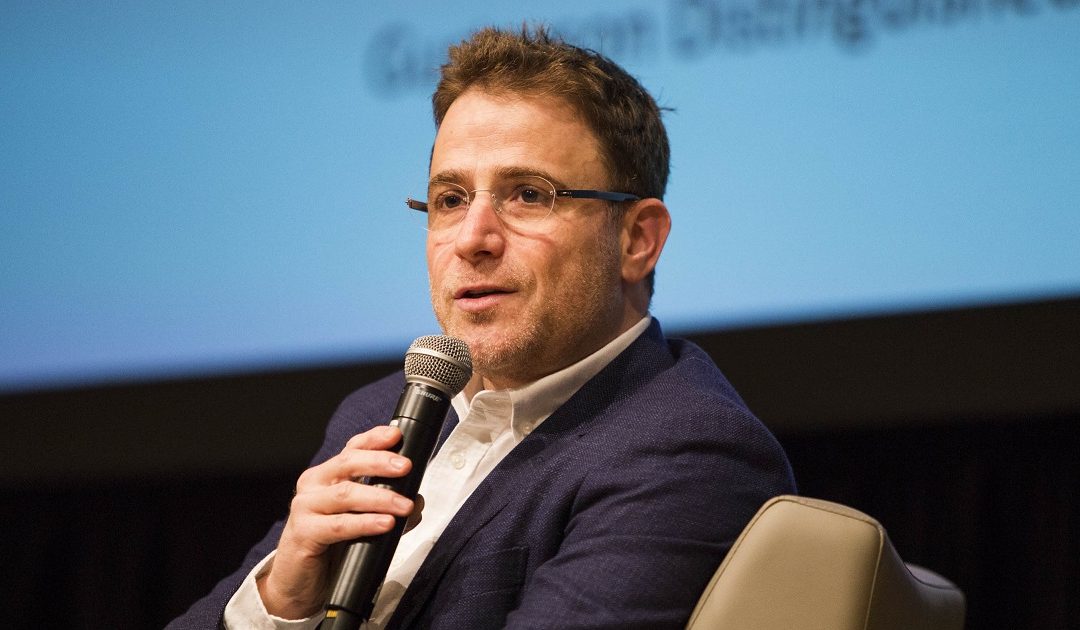By Carlos Chicas Berti. Originally published in the fall 2018 issue of Business Class magazine. For more information about the Distinguished Entrepreneur of the Year Award, contact deya@uvic.ca.
Stewart Butterfield, BA Philosophy ’96, knows better than most that the road to success is paved with failure. The co-founder and CEO of Slack, and our 2018 Distinguished Entrepreneur of the Year honouree, took to the stage at the Victoria Conference Centre this spring to accept the award and converse with students and business leaders about his philosophy on business, life and success in the tech world.
Butterfield stresses that “success makes a lousy teacher”––it was, after all, in the failure of both of his game ventures that he ultimately found success. His first project, Game Neverending, an intricate multiplayer video game, never attained success, but in its collapse, Butterfield came up with a new idea. “We had developed all this incredible technology, so we thought there must be something we can do with this to come to market more quickly,” says Butterfield. He soon developed a new plan, using his team’s technology to create a start-up devoted to online photo sharing — a project that became the website Flickr.
After selling Flickr to Yahoo! and leaving the company in 2008, Butterfield returned to game development. Yet his new game, Glitch, failed in a similar fashion to Game Neverending. The decision to end Glitch was extremely difficult for Butterfield.
 “We’re often told to follow our dreams and never give up,” he says, “but there’s also a point where you should stop throwing good money after bad, and realize that this thing just isn’t going to work.” Butterfield used the remaining start-up capital from Glitch to further develop the real-time collaboration and messaging platform that his team had created and used internally while working on Glitch.That collaboration platform was eventually launched as Slack, and now boasts over eight million daily users.
“We’re often told to follow our dreams and never give up,” he says, “but there’s also a point where you should stop throwing good money after bad, and realize that this thing just isn’t going to work.” Butterfield used the remaining start-up capital from Glitch to further develop the real-time collaboration and messaging platform that his team had created and used internally while working on Glitch.That collaboration platform was eventually launched as Slack, and now boasts over eight million daily users.
It was at UVic that Butterfield originally discovered his passion for computers. “In 1992 I went to the basement of the Clearihue building, and was given my first account in the school’s UNIX machine. That gave me access to the internet, which completely changed my life,” Butterfield remembers. He was astonished by the types of relationships computers could create. “I loved the idea that we could transcend geography and connect with people with whom we shared interests.”
A philosophy student at heart, Butterfield wasn’t afraid to share his thoughts on some of the issues facing the corporate world in the modern era. Butterfield believes communication is key in order to fight dissatisfaction in the workplace. “There’s a lot of alienation and most of it comes from not understanding the context of where decisions are being made, and so a lot of cynicism creeps in.” Butterfield believes that transparency and the creation of a shared company vision are integral to leading a successful company. “To the extent that people are able to know how decisions are being made, they are much more empowered and more capable.”
At Slack, Butterfield is focused on creating a different kind of workplace. The company has devoted itself to investigating pay equity and rates of promotion. It now ensures the company fosters an environment where the rates of attrition are significantly lower than the rest of the tech industry. Butterfield believes all corporations need to have honest conversations about the way they do business. “At Slack, the way we conduct ourselves in the world is to a very high ethical standard, and to the degree that we’re successful, hopefully people will try to emulate that.”


